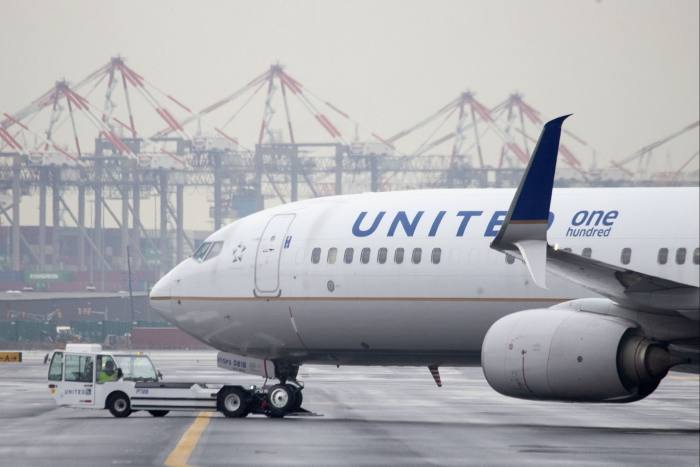Jets cross the sky 30,000 feet above millions of acres of corn blanketing the US heartland. As airlines face pressure to cut emissions, they have joined forces with farmers to lobby in Washington so that corn helps power those planes.
Their push has encountered resistance from environmental groups that say refining corn into biofuels has minimal benefits for earth’s climate. New tax rules that could make or break corn ethanol’s prospects as a so-called sustainable aviation fuel may be released as soon as next month.
Airlines have pledged net zero emissions by 2050. But their plan hinges on sustainable aviation fuel that is in scarce supply, made mainly from cooking oil or animal fats.
The US biofuels industry, the world’s largest, was supercharged by a 2007 law that forced blending increasing amounts of ethanol into petrol. The industry now faces the threat of declining demand, however, as more battery-powered cars arrive on American roads.
With airlines in need of a product and biofuel refiners looking for a new market, they have allied to include ethanol in the plane fuel mix.
Their lobbying campaign is centred on tax credits for aviation fuel established in the Inflation Reduction Act, the landmark climate law signed by President Joe Biden a year ago. The credits are worth $1.25 a gallon for fuels that reduce emissions by at least 50 per cent compared with jet fuel, and up to $1.75 per gallon for further reductions.
Carriers such as United Airlines and Alaska Airlines have joined farm groups, US biofuel refinery owners such as Archer Daniels Midland and Green Plains, and international oil companies including BP and Shell, to push federal tax officials to embrace an analysis of greenhouse gas emissions that would make ethanol eligible for more generous tax credits.
The International Air Transport Association estimates airlines will globally need 450bn litres (119bn gallons) of sustainable fuel a year to meet its mid-century carbon goals, but last year refiners made about 300mn litres.
Tom Michels, United Airlines’ director for government affairs, said the aviation industry wants to create incentives to make more sustainable fuel. He said using biofuels that are currently on the market will reduce emissions more quickly than holding out for advanced fuels that are not available at industrial scale.
“The fuels that are available to us today will not be as good as the fuels available to us in 20 years,” Michels said. “That doesn’t mean we should wait 20 years for the perfect fuel. My question would be, are these fuels better than oil?”

The airlines, refiners and farmers prefer an analysis known as Greet, based on a model developed at the federal Argonne National Laboratory. The IRA law already designates Greet as the tool to measure emissions for renewable diesel, another former of biofuel.
But for aviation, environmentalists want tax officials to hew to a standard known as Corsia, established by the UN’s governing body for aviation. Corsia penalises fuels more harshly than Greet for changes in land use associated with planting crops, as when trees are cut down. Ethanol’s overall emissions look higher using the Corsia model.
Ethanol gives “the illusion of climate action from these airlines” while reducing emissions less than newer sustainable fuels, said aviation analyst Lucca Ewbank of InfluenceMap, an environmental think-tank. Incentives for ethanol could discourage refiners from scaling up less carbon-intense alternatives, she said.
“If you’ve got this fuel that’s cheaper and readily available, and you’re getting the tax credit for it, that may incentivise not investing money, time and R&D in these new fuels,” she said. “There’s a huge risk that this could happen.”
The Biden administration is split over which model to endorse, with White House senior climate adviser John Podesta charged with resolving the divide, according to a report in early August from Reuters.
The farmer-backed biofuel industry is influential in Washington, operating refineries dotting the rural Midwest that buy more than a third of the US corn crop. Legislation promoting the Greet standard has appeared in the US House and Senate, making bedfellows of Democrats and Republicans from Illinois to Nebraska.
Linking fuel tax credits to lower carbon intensity would be relatively straightforward “in the absence of the power of the corn lobby”, said Ryan Todd, an analyst at Piper Sandler. “The question is whether the power of the US agricultural industry manages to water it down to their benefit.”
If airlines can persuade the government to extend tax credits to ethanol — even if it reduces emissions less than alternatives — the potential supply of what counts as sustainable aviation fuel grows larger and likely cheaper, Todd said. “So you can see where the incentives would lie.”
At $7.98 a gallon, sustainable aviation fuel costs more than two and a half times the US industry’s standard petroleum-based fuel, known as Jet A. Airlines are reluctant to commit to buying a product that would raise their costs compared with competitors, while refiners hesitate to invest capital in research or new factories without guaranteed customers.
Ethanol currently sells for $2.18 a gallon, though the fuel requires additional processing to power aircraft. So-called ethanol-to-jet is “an even more nascent and small part of the already nascent and small (but growing) SAF industry”, said Thomas Dwyer, head of Americas biofuel pricing at Argus Media.
Aviation is “a potentially large market for ethanol producers”, said Geoff Cooper, chief executive of the Renewable Fuels Association. But if the IRS opts for the emissions analysis favoured by environmentalists, biofuels will flow instead towards renewable diesel and trucking, and regulators will in effect “eliminate the only viable form of SAF in the near term”.
The question of land use change can seem abstract. But scientists at the University of Wisconsin-Madison published a paper last year that found the Renewable Fuel Standard enacted by the 2007 law increased US cropland by 2.1mn hectares (5.2mn acres), causing “enough domestic land use change emissions such that the carbon intensity of corn ethanol produced under [the standard] is no less than gasoline”.
The RFA called the paper’s findings “preposterous” and said it had been “discredited by academic researchers and technical experts”.
Seth Spawn, one of the paper’s authors, recalled the six years he spent driving the highway between Wisconsin and his parents’ home in Minnesota, and how he noticed stands of trees just off the highway that had been cut down and replaced with corn.
The land area identified in the study may be “a drop in the bucket”, he said, “but when you map out the environmental impacts, it still ends up being a pretty significant impact.”
Credit: Source link











